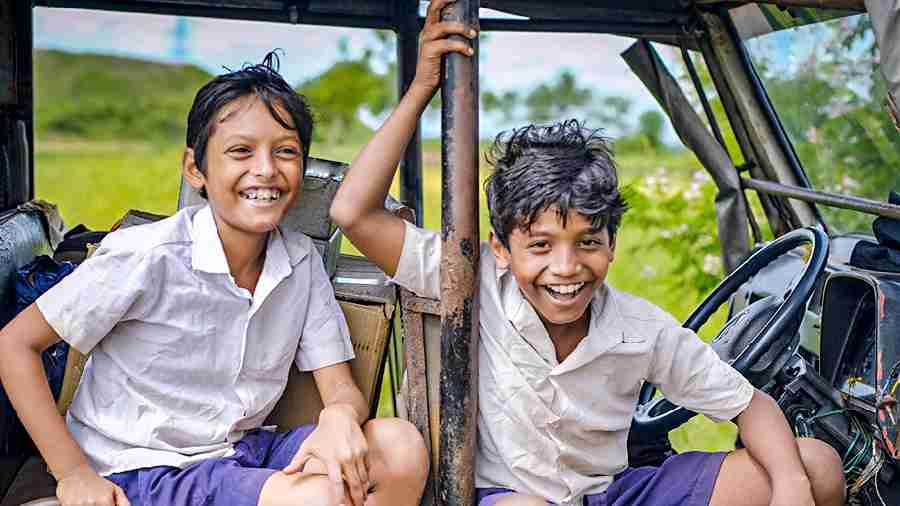Two happy, smiling faces have been peeking out in a crowd of explosive Oppenheimer and pink-awash Barbie posters at theatres across Taiwan since last Friday, when the Bengali-language film Dostojee released in the home country of its producer.
Ivy Yu-Hua Shen, young Taiwanese producer, and Prasun Chatterjee, director of Dostojee, had a chance encounter in Goa in 2019. It was a case of “mistaken identity” as Chatterjee walked up to Ivy at the NFDC Film Bazar and nudged her backpack to say ‘hello’. “He had mistaken her to be the programmer from Hong Kong he was trying to pitch his film to,” Ivy recalled at a special premiere show of Dostojee at Taipei’s SPOT Huashan Cinema — one of the 16-odd theatres in more than five cities — Taipei, New Taipei City, Taoyuan, Hsinchu, Taichung, Tainan and Kaohsiung — across Taiwan where the film was released.
The rest, as they say, is history with Dostojee, which means friend in a rural dialect of Bengal, traveling across the world and eventually reaching Ivy’s home country of Taiwan.
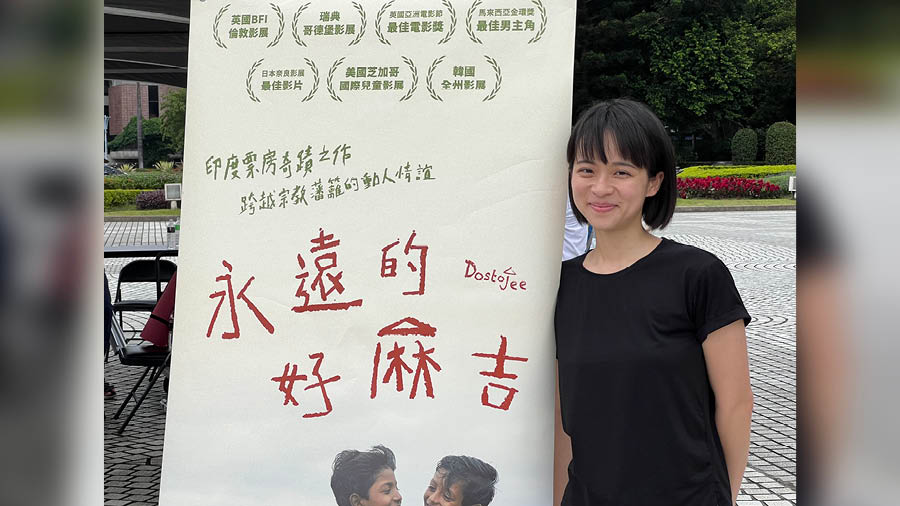
Ivy Yu-Hua Shen, the young Taiwanese producer of ‘Dostojee’, with the film’s poster in Taiwan
The 30-year-old Taiwanese is more than just the co-producer of Chatterjee’s debut film. She lent support to Dostojee at a time when even Indian producers and production houses were unwilling to put their money on a first-time filmmaker with no prior experience in filmmaking or being part of a movie project.
Chatterjee gives all credit to Ivy for the film’s journey across the world. “No, it’s not me. It’s Dostojee,” Ivy is quick to retort during an online interaction with the two.
“When I saw the innocent and charming faces of the two boys in the early rushes Prasun sent to me a few weeks after our chance meeting in Goa and sought my help; I was quite convinced that I could help him make his maiden film and take it to festivals across the globe. I saw Dostojee’s potential to become a good art house film for the festival circuit,” the Taiwanese co-producer revealed.
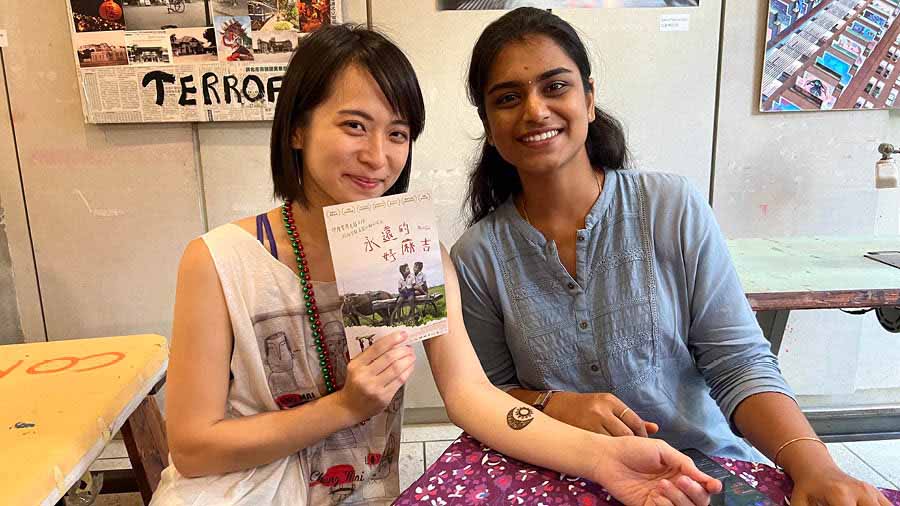
Ivy during a mehendi session in India
With her prior experience of taking films and pitching scripts to prominent international film festivals like the Cannes and Berlin, Ivy has come of age with Dostojee, which became one of the first films after she decided to go solo and launch her own production house, Betula Films. The name, which is also the genus of different species of birch trees, is taken from Ivy’s original Mandarin name of Yu-Hua.
“I told Prasun that I may not be able to help him financially, but I can provide him ways to take the film to various global platforms,” the Taiwanese explained, continuing, “I was in Kolkata in early 2020 and was brainstorming with Prasun to make the film, depicting the story of the village boys from a nondescript hamlet in a far-flung area of Bengal, and its different socio-cultural connotations and nuances understandable to an international audience.”
Taiwan has become a strategically significant geopolitical hotspot. India has no formal diplomatic ties with the island nation, claimed by the Communist Chinese regime in Beijing as its wayward province. But a nonchalant Chatterjee said, “For me, she is Ivy. I didn’t care whether she was from India, Taiwan, or another country. Anybody who could support the film was welcome, and I am glad that Ivy joined hands to make the film better like a true Dostojee.”
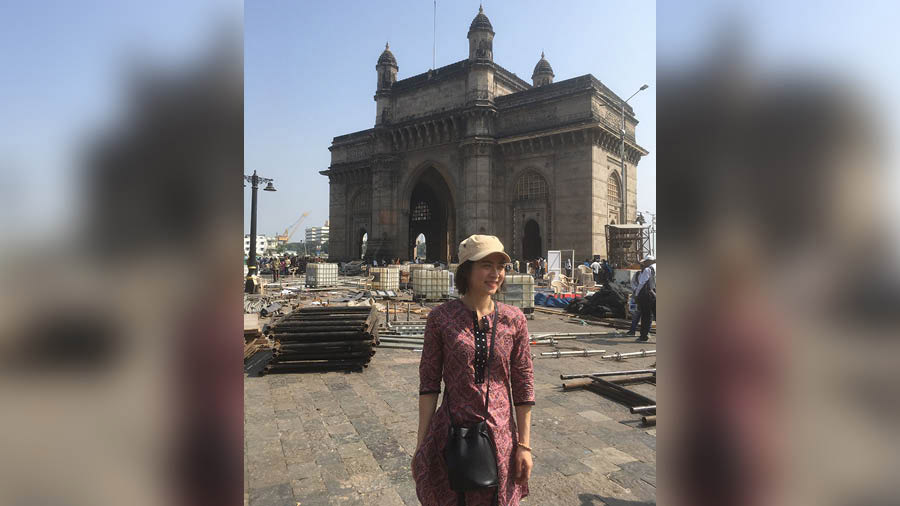
Ivy at the Gateway of India, in Mumbai, in 2019
The Taiwanese returned from India just before the first lockdown. Since then, she has yet to get a chance to go back to India again, with pandemic-related various travel restrictions lingering both in Taiwan and India over the past three years. Instead, she has been online discussing multiple strategic nitty-gritties related to the film’s distribution and promotions with the filmmaker and his Kolkata-based team.
The film has traveled to many festivals and won accolades, adulation and awards. Moreover, since its official release in India, it has been commercially screened in theatres across various countries, including the US, UK, Australia and the UAE, with English subtitles. But before releasing Dostojee in Taiwan, Ivy and her outsourced team in Taipei had to work hard for months on specially created subtitles in traditional Chinese – a Mandarin script used in Taiwan, unlike the simplified Chinese of mainland China.
Apart from ensuring Dostojee's release in her country of birth with both English- and Mandarin-language subtitles, the one-person production house has already been working on a slew of other international projects. The producer, who hails from central Taiwan’s Taichung City, mentioned, “Apart from Prasun, I have already worked with other filmmakers from India and South Asia as well. I can feel their passion and a burning desire to deliver good cinema. I often cite their examples to filmmakers here.”
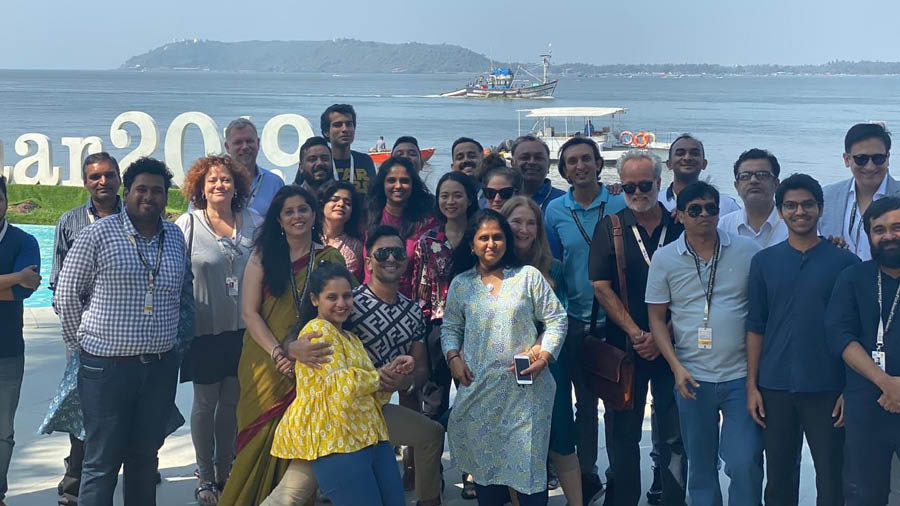
Ivy with a group at the NFDC Film Bazar
When asked about any regrets, Ivy said, “I never got a chance to meet these two boys in person who played the lead in Dostojee and wowed cine lovers all over the world even without any formal training in acting. I recently saw their latest photographs, and they are now tall teenagers. You won’t be able to recognise them.”
She liked the “easy-going nature” and affable people of Kolkata during her stay, but like most outsiders, she couldn’t develop a sweet tooth for the city’s famous mishtis. However, she still fondly remembers her short sojourn to Santiniketan, where she found “spiritual solace” and learnt more about Rabindranath Tagore. “There is a Tagore poem that you can find in Dostojee,” Ivy signed off sunnily with a grin of satisfaction before guiding her Taiwanese guests inside the theatre.
The author is a Taiwan-based television journalist and Chinese-language scholar.
